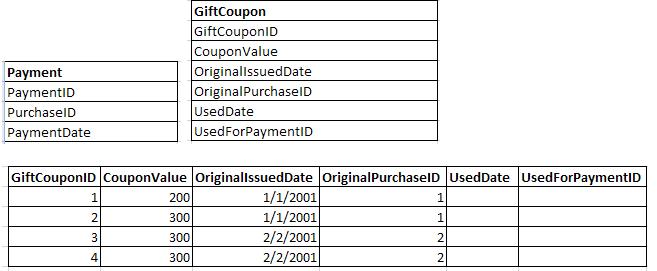一个事务中的多个集合/存储库
我有如下所示的支付系统。付款可以通过多种礼券进行。礼品券是在购买的同时发放的。顾客可利用此礼券作日后购买用途。
当通过礼品优惠券付款时,需要用该UsedForPaymentID更新GiftCoupon表中的PaymentID列(对于礼品优惠券ID)。
GiftCouponID已经在数据库中可用。当顾客生产礼品优惠券时,它会印上GiftCouponID。操作员需要将此CouponID输入系统以进行支付。
对于MakePayment()操作,它需要两个存储库。
- 礼券库房
- 付款仓库
代码
//使用GiftCouponRepository检索相应的GiftCoupon对象。
这涉及到为一个事务使用两个存储库。这是一个很好的练习吗?如果没有,我们如何才能改变设计以克服这一问题?
引用:在DDD中,聚合应该表示事务边界。一个需要多个聚合参与的事务通常是一个迹象,表明要么应该改进模型,要么应该检查事务需求,或者两者都需要。CQRS对我的域名正确吗?

C#代码
public RepositoryLayer.ILijosPaymentRepository repository { get; set; }
public void MakePayment(int giftCouponID)
{
DBML_Project.Payment paymentEntity = new DBML_Project.Payment();
paymentEntity.PaymentID = 1;
DBML_Project.GiftCoupon giftCouponObj;
//Use GiftCouponRepository to retrieve the corresponding GiftCoupon object.
paymentEntity.GiftCouponPayments = new System.Data.Linq.EntitySet<DBML_Project.GiftCoupon>();
paymentEntity.GiftCouponPayments.Add(giftCouponObj);
repository.InsertEntity(paymentEntity);
repository.SubmitChanges();
}回答 3
Stack Overflow用户
发布于 2012-07-12 12:59:05
我认为您真正想问的是关于“Multiple Aggregates in one transaction”的问题。我不认为使用多个存储库在事务中获取数据是有什么问题的。通常,在事务处理期间,聚合将需要来自其他聚合方的信息,以决定是否更改状态或如何更改状态。这很好。然而,在一个事务中修改多个聚合的状态被认为是不可取的,我认为这正是您引用的引用试图暗示的。
这是不可取的原因是由于并发。除了保护其边界内的内部变量外,还应保护每个聚合不受并发事务的影响。例如,两个用户同时对一个集合进行更改。
这种保护通常是通过在聚合的DB表上设置版本/时间戳来实现的。在保存聚合时,将比较正在保存的版本和当前存储在db中的版本(这可能与事务启动时不同)。如果它们不匹配,则会引发异常。
基本上可以归结为:协作系统中的(许多用户进行了许多事务),单个事务中修改的聚合越多,并发异常就会增加。
如果聚合太大,同样的情况也是一样的&它提供了许多状态更改方法;多个用户一次只能修改一个聚合。通过设计在事务中单独修改的小聚合,可以减少并发冲突。
沃恩·弗农( Vaughn Vernon )在他的第三篇文章中对此做了出色的解释。
然而,这只是一项指导原则,在需要修改一个以上的集合时会有例外情况。您正在考虑是否可以将事务/用例重新分解为只修改一个聚合,这是一件好事。
考虑到您的示例之后,我想不出将它设计成满足事务/用例需求的单个聚合的方法。付款需要创建,优惠券需要更新,以表明它不再有效。
但当真正分析这项交易的潜在并发性问题时,我不认为在礼品券总额上会发生冲突。它们只会被创建(发行)然后用于支付。之间没有其他状态更改操作。因此,在这种情况下,我们不需要担心这个事实,我们正在修改支付/订购和礼品优惠券的总和。
下面是我快速想出的一种可能的建模方法
- 如果没有付款的订单汇总,我看不出付款有什么意义,所以我介绍了一个。
- 订单是由付款组成的。可以用礼券付款。您可以创建其他类型的支付,例如CashPayment或CreditCardPayment。
- 若要支付礼品优惠券,必须将优惠券总额传递给订单汇总。这标志着优惠券的使用。
- 在交易结束时,订单汇总将与其新付款一起保存,并且使用的任何礼品优惠券也会保存。
代码:
public class PaymentApplicationService
{
public void PayForOrderWithGiftCoupons(PayForOrderWithGiftCouponsCommand command)
{
using (IUnitOfWork unitOfWork = UnitOfWorkFactory.Create())
{
Order order = _orderRepository.GetById(command.OrderId);
List<GiftCoupon> coupons = new List<GiftCoupon>();
foreach(Guid couponId in command.CouponIds)
coupons.Add(_giftCouponRepository.GetById(couponId));
order.MakePaymentWithGiftCoupons(coupons);
_orderRepository.Save(order);
foreach(GiftCoupon coupon in coupons)
_giftCouponRepository.Save(coupon);
}
}
}
public class Order : IAggregateRoot
{
private readonly Guid _orderId;
private readonly List<Payment> _payments = new List<Payment>();
public Guid OrderId
{
get { return _orderId;}
}
public void MakePaymentWithGiftCoupons(List<GiftCoupon> coupons)
{
foreach(GiftCoupon coupon in coupons)
{
if (!coupon.IsValid)
throw new Exception("Coupon is no longer valid");
coupon.UseForPaymentOnOrder(this);
_payments.Add(new GiftCouponPayment(Guid.NewGuid(), DateTime.Now, coupon));
}
}
}
public abstract class Payment : IEntity
{
private readonly Guid _paymentId;
private readonly DateTime _paymentDate;
public Guid PaymentId { get { return _paymentId; } }
public DateTime PaymentDate { get { return _paymentDate; } }
public abstract decimal Amount { get; }
public Payment(Guid paymentId, DateTime paymentDate)
{
_paymentId = paymentId;
_paymentDate = paymentDate;
}
}
public class GiftCouponPayment : Payment
{
private readonly Guid _couponId;
private readonly decimal _amount;
public override decimal Amount
{
get { return _amount; }
}
public GiftCouponPayment(Guid paymentId, DateTime paymentDate, GiftCoupon coupon)
: base(paymentId, paymentDate)
{
if (!coupon.IsValid)
throw new Exception("Coupon is no longer valid");
_couponId = coupon.GiftCouponId;
_amount = coupon.Value;
}
}
public class GiftCoupon : IAggregateRoot
{
private Guid _giftCouponId;
private decimal _value;
private DateTime _issuedDate;
private Guid _orderIdUsedFor;
private DateTime _usedDate;
public Guid GiftCouponId
{
get { return _giftCouponId; }
}
public decimal Value
{
get { return _value; }
}
public DateTime IssuedDate
{
get { return _issuedDate; }
}
public bool IsValid
{
get { return (_usedDate == default(DateTime)); }
}
public void UseForPaymentOnOrder(Order order)
{
_usedDate = DateTime.Now;
_orderIdUsedFor = order.OrderId;
}
}Stack Overflow用户
发布于 2015-03-03 23:56:01
我将提交的答案是“它取决于”(Tm),因为它归根结底是“足够好”。
问题空间和技术实现的背景都不为人所知,将影响到任何可接受的解决方案。
如果技术允许(例如在ACID数据存储中),那么从业务角度来看,使用事务可能是有意义的。
如果这些技术没有提供这些功能,那么可能有必要“锁定”所有的优惠券和支付记录,以使更新保持一致。需要对锁的时间和可能发生的争用进行调查。
第三,它可以通过以下粗糙的业务流程策略作为多个事务/聚合来实现。
注意:我没有定义聚合之间的交互是如何发生的,因为不知道技术需求。
- “创建”第一个集合(我们将其命名为购买汇总),它将记录预期的付款,以确定要使用的优惠券。
- 尽可能晚,确认当前的业务策略是有效的(每个优惠券都是有效的)。如果没有,请取消/停止业务事务。
- 将购买总量保持在“暂时”状态。
- 与每个优惠券汇总互动,以“调整限额”的暂定购买。回答成功/失败。
- “调整限额”将改变其他潜在购买总额的可用金额。
- 如果任何一张优惠券没有“调整限额”,那么该购买将被“取消”,而经批准的优惠券限额将被重新调整回购买前的请求金额(而该购买现在处于“取消”状态)。
- 如果所有的优惠券限制都被调整,那么购买就处于“最后确定”状态。
- 在“最后确定”状态中,系统现在与每个优惠券聚合进行交互,以“最后确定优惠券的使用”,其中可能会将购买的优惠券使用情况记录在优惠券聚合上(取决于业务逻辑和需求)。
- 一旦所有的优惠券使用已经最后确定,然后购买总量被设置为‘批准’的状态,任何额外的业务流程都可以开始。
从业务和技术能力的角度来看,很多选择将取决于什么是正确的。无论是现在还是将来,每种选择的利弊都会影响到企业的成功。“这取决于”(Tm)
Stack Overflow用户
发布于 2015-06-22 23:33:25
2办法:
- 两笔单独的交易。如果事务2失败,那么事务1应该回滚.
- 卡是一个帐户。将交易记录在该帐户上。如果计算余额(所有事务的总和)达到零(或更少,不应该发生),那么卡是‘使用’-但不要记录‘使用’在DB。只要从平衡中得到它。
https://stackoverflow.com/questions/11445657
复制相似问题

